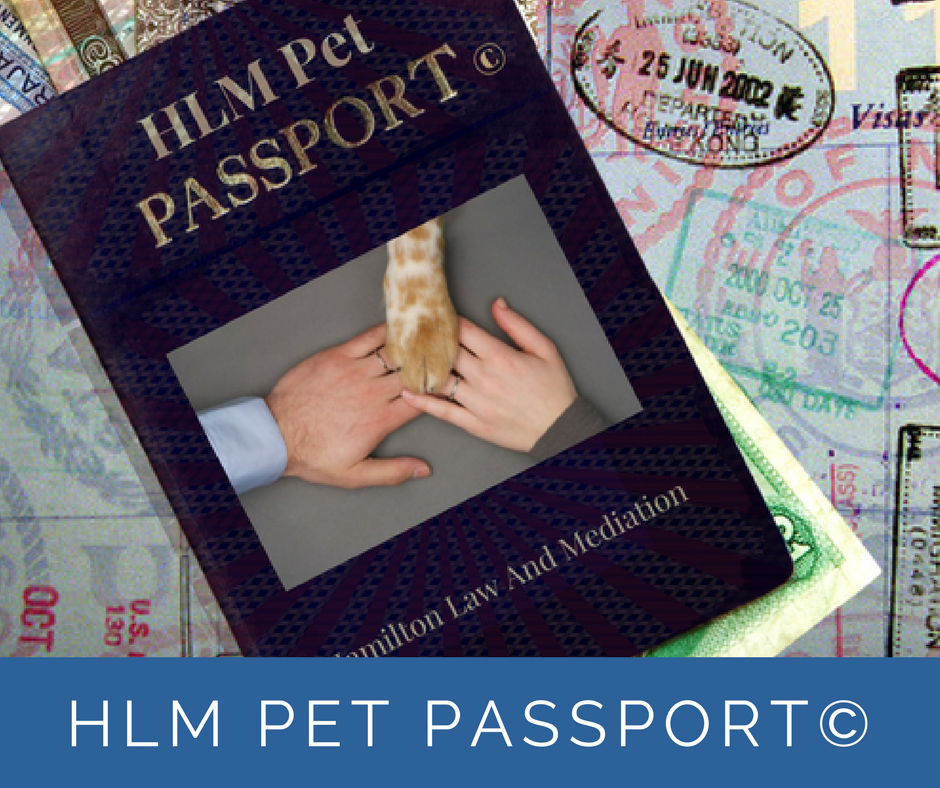Herding cats is difficult. We often use this term colloquially whenever we are trying to pull difficult people or things together. I’ve used it to describe my efforts to encourage colleagues to provide documents or articles in support of the presentation they are giving and I am moderating. I’ve used it when my family is leaving for an event they really don’t want to attend. And, as we will discuss below, describing clients who are finding it hard to decide how to go forward after a divorce with or without their pet.
It is often difficult for anyone to comprehend living their life without the companionship of their furry or feathered friend. Traditionally, at the termination of a relationship, one person leaves with the pet and the other does not. This can often be achieved after a:
•civil discourse about the best interests of the pet or
•a substantial amount of money is paid in lieu of taking the pet.
Why is this?
Well, there are infinite reasons for holding a pet hostage. I list some of the ones I have mediated below:
•The parties don’t want to see each other again; so maintaining a relationship over the pet is out of the question.
•One party has no affinity for the pet, so relinquishing possession of the pet is a no brainer.
•One party may feel the other person loved the pet more then the spouse and will hold the pet ransom to get even.
•One party just wants to ‘take their last bite at the apple’ or ‘twist the knife’ one more time over who gets the pet.
These are only a few of the motives I have heard in mediation from parties struggling with the future custody of a pet.
I have mediated pet custody conflicts in divorce or relationship separations for several years. I help my clients find a resolution to their conflict surrounding a pet, in a way that respects both their positions and needs. It is sometimes simpler to work out the custody of the children than it is for a beloved pet.
You might ask why that is? In my experience there are two reasons:
First – Attorneys don’t understand the value in allowing an emotional discussion to be had around the value the pet brings to each party’s life. In the eyes of the law a pet is property, like a chair. On an emotional level attorneys probably realize a pet means so much more to our client, yet feel they must hold fast to the legal realities of what we can do under the law.
Second- there is no organized system, comparable to child custody, to discuss the future arrangements for a pet, even though, in some instances, these pets are the parties’ children. There are no checks or balances on how people proceed.
I find, when a pet is in the middle of a divorce conflict, it is because this pet is the embodiment of the last best thing left in a marriage. The pet usually doesn’t choose sides and provides solace to both parties equally as they go through this traumatic event. A pet doesn’t require an explanation of what is going on between its people. Last but not least, the pet was usually acquired during a better time in this couple’s life.
How do parties come to terms with sharing the pet or leaving it behind?
By having a thorough and impassioned discussion with an understanding mediator of how they see themselves continuing a relationship with their pet. To do anything less is to set the parties up for a long and difficult process. Each party needs a chance to express how they feel about the pet. This conversation will help the parties know what they need and want from their continued relationship with their pet, sans their humans partnership.
I’ve found, in more than a few instances, that my clients were not in conflict about the pet until an attorney advised them they were entitled to 50% of that pet. This is proper representation by an attorney on behalf of their client. As I said before a better question to ask is how they see their pet continuing to be a part of their life? What does the client really want?
These kinds of questions often hinder a client who wants to hold the pet at ransom because they own 50%? Initially, they had no intention of keeping the pet, yet once they realize they might get some money for leaving it behind, GREAT! The attorney sets up this scenario because he/she is unaware of the conflict brewing just under the surface between the parties over the pet. The attorney treated the pet like property, at its ‘chair-like’ value, and may unwittingly have created a place for more angst to be meted out from one party to another.
When handling these issues as pure property questions, the party who wants the pet, prepares him/herself to paying whatever it costs to keep their pet, even if it is old. I read an article in the Miami Herald, interviewing divorce attorneys on ‘pet related choices’ clients had made. One attorney stated they were amazed at a client who left $20,000.00 on the table to keep a dog, and it was old. This one statement indicates the multitude of misunderstanding between the client and the attorney in these types of matters.
The fact that the pet was old is likely why it went at such a high premium. Clearly, if a discussion was had, revealing all the pimples and warts around why the pet was being held hostage, the need to pay to keep the pet, holding it at ransom so to speak, may have been prevented or greatly reduced.
Unlike a conflict over a chair, which can be sold and the proceeds distributed to the parties; a pet cannot easily be divvied up. The chair will be fine in its new home… a pet, not so much. As an attorney, you need to recognize the language you use may set up the scenario in which a pet is held for ransom and that ‘faux pas’ is inexcusable.
A successful divorce attorney should develop the art of asking rather than telling a client what their future plans might be for a pet. Sometimes the need to continue to harass, get even, or manipulate the other party is so strong, the pet is just a pawn in the game of hurt and rejection. Don’t get caught in the trap. If you are, the easy fix is to go back and ask, “How do you see this pet fitting into your life going forward?” If the client gives you a succinct plan of action then chances are they are truly desirous of keeping the pet in their life. You should work to make that happen. If they have no plan other than to hurt the opposing party, you need to explore other ways to get at the crux of the angst. Ask your clients to rise above using the pet as a weapon.
Helping clients resolve conflicts surrounding pets is a lot like herding cats. It is the least favorite thing attorneys want to talk about with their clients but the most important for the continuity of life for their pet. I recognize the pet is not your client and is property under the law, but to your clients it is so much more. Take the time to get all the underlying information out about the Why? and How? You will end up helping the parties decide what is best for them and their pet in a way they can understand and abide by.
Give it a whirl. Meow!






